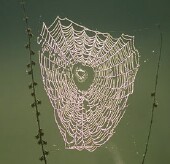- Could Your Grocery Store Meat Be Causing Recurring UTIs?
- Are You Making This Expensive Thermostat Error This Winter?
- Recognizing the Signs of Hypothyroidism
- 10 Strategies to Overcome Insomnia
- Could Artificial Sweeteners Be Aging the Brain Faster?
- Techniques for Soothing Your Nervous System
- Does the Water in Your House Smell Funny? Here’s Why
- Can a Daily Dose of Apple Cider Vinegar Actually Aid Weight Loss?
- 6 Health Beverages That Can Actually Spike Your Blood Sugar
- Treatment Options for Social Anxiety Disorder
You’re Unlikely to Get a Skin Infection From a Spider’s Bite, Review Finds


New research dispels the widely held belief that spiders are a common cause of skin infections in people.
“Although spider bite may be an attractive and tenable causative agent of a bacterial infection, the data show this is highly improbable,” the review’s lead author Richard Vetter, former staff research associate in the entomology department at the University of California, Riverside, said in a university news release.
Spiders have been used as a scapegoat for bacterial infections, Vetter said. He suggested that any link implied between a skin issue and a spider bite should be considered suspect, because so few spider bites seem to result in infection.
“When examining reports of thousands of spider bites of many species worldwide, we found almost no mention of infection associated with the arachnid-inflicted injury,” he said.
The only credible report of a spider bite leading to skin infection involved a very large spider called an Australian golden silk spider, according to the authors of the review.
“It resulted in colonization by a bacterium rarely found in humans,” he said. “The bite led to a pus-filled lesion that persisted more than two months,” Vetter explained.
In one of the studies the researchers reviewed, 182 people said they’d been bitten by a spider. Only 4 percent of those suspected bites were definitively linked to spiders, “while about 86 percent had skin infections,” according to Vetter.
The findings are published in the January issue of the journal Toxicon.
Vetter urged doctors and the general public to stop blaming spiders for skin infections.
“This medical platitude is not supported by the history of spider bite data and could lead to misdiagnosed patients who then have an overzealous reaction that could, in turn, lead to the unwarranted development of arachnophobia in bite victims, possibly then requiring psychological desensitization to spiders or excessive use of pesticides in living spaces,” Vetter said.
More information
The U.S. National Library of Medicine has more about spider bites.
Source: HealthDay
Copyright © 2026 HealthDay. All rights reserved.










